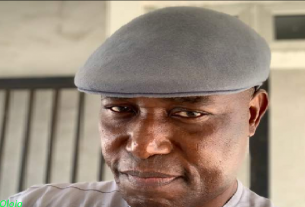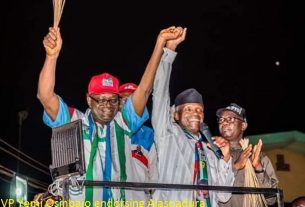By Femi Mimiko, mni,
The Nigerian Political Science Association (NPSA), under the transformational leadership of Professor Hassan Saliu, of the University of Ilorin, held its second virtual conference this year, July 16 and 17, 2025, on the theme, “Democracy and Development: Exploring the nexus in Nigeria.” The first day was chaired by a foremost Political Scientist, His Excellency, Professor Tijjani Mohammed-Bande, GCON, former Permanent Representative of Nigeria at the UN, and President of the 74th UN General Assembly. One of the two lead presentations taken at the the opening ceremonies, was by yours sincerely. It was titled, “Isn’t democracy itself a big illusion? Exploring the democracy-development nexus in Nigeria since 1999.”
The concept of democracy remains quite contentious, both in its theoretical representation, and in the manner in which it is interpreted in different climes. What is important, in the circumstances, is that any claim to democratic governance must meet the critical cannons of popular participation, majority rule and respect onto minority rights, and public accountability. For reasons of differing histories of evolution, cultural specificities, resilience of governance institutions, and attitudes of the leaders and the led alike, the state of democracy differs across climes, with countries occupying different points on the wide continuum between transition from authoritarianism to democratic consolidation. In more recent times, an incipient pattern of democratic reversal, has become noticeable across the globe; not just in its most dramatic manner (as represented by ‘the epidemic of coup d’états’ in Africa, but also by the widening frontiers of authoritarianism in hitherto celebrated democracies, where populism, in its different variants, and far-right tendencies, are rolling back some of the more important gains of democracy.
There exists a strong correlation between quality of governance and possibilities of economic development, where the latter, in the words of UNDP (2025), speaks to ‘the richness of human life,’ rather than mere ‘richness of the economy in which human beings live.’ For, ultimately, as we argued elsewhere, development is about choices, made on behalf of a collective by individuals empowered by law, and working through State institutions, to so do. This is why the shape of the governance system in place in any society is integral to the development quotient therein (Mimiko, 2025).
The tardiness of democracy at engendering true social development in Nigeria – political and economic – cannot be wished away. The process is yet to exhibit a great deal of the key elements by which democracy is defined. The general challenge that the economy has come to represent for most Nigerians, 63% of whom – by official figures – live in multidimensional poverty, is also some form of criticism of democracy in the country. Even so, while the democratic system may be slow in its march into maturity, it is significant that the process has been sustained since 1999. The country has also seen peaceful transition of power from one political party/government to another. In spite of genuine concerns about the seeming erosion of the credibility of the judiciary, Nigerian politicians still choose to approach the courts for adjudication on election matters, rather take the laws into their own hands. The deepening of civil society engagement – including the media – in the democratic space must also not be taken for granted, fitting as it were, into the overall drive in the direction of democratic consolidation. There is also ample evidence that macroeconomic stability, without which the economy will not rebound, is now being delivered, albeit in a manner considered quite painful to most Nigerians. These are no doubt, significant accomplishments for a country that had faced bouts of martial and civil rule, for several years prior 1999, superintended by leaders of different motivations, intendments, and capabilities – some of whom practically laid the country to waste.
The bottomline is that democracy surely has its challenges, both in terms of the fluidity of some of its core theoretical assumptions, and in the manner in which it is interpreted and practiced, not only in Nigeria, but across the world; yet, there doesn’t seem to be any form of governance that measures up to it in terms of its predictability, orderly transition of power from one government to another, and mainstreaming of the interest of the majority of the population, made so by the logic of periodic elections. For these reasons, anchored on the innate superiority of democracy over all other forms of governance, the challenge before Nigeria, is not to disown and abandon democracy. Rather, it is to keep at it, and continue to reform same in the light of our evolving experience, and the cultural sensibilities of Nigerian peoples and communities. It is to put the citizenry at the centre of governance; strengthen the levers of public accountability; and mainstream the aspirations of Nigerians for stability, inclusivity, and advancement in their material condition (Mimiko, in Muzee, 2022: v – ix). It must focus on how to deal with the challenges of constricting economic opportunities, insurgency, terrorism, and climate change (Ibid). All of these will have to be embedded in a workable democratic governance framework; one that conveys substantive, rather than mere descriptive representation.
Citation:
Mimiko, NO (2025).
“Isn’t democracy itself a big illusion? Exploring the democracy-development nexus in Nigeria since 1999,” Lead Paper, presented at the Nigerian Political Science Association (NPSA) 2nd Virtual Conference, July 116 – 17. https://www.facebook.com/share/p/19fbg2fQBe/
- Mimiko is a professor of Political Science at Obafemi Awolowo University, OAU, Ile Ife.





